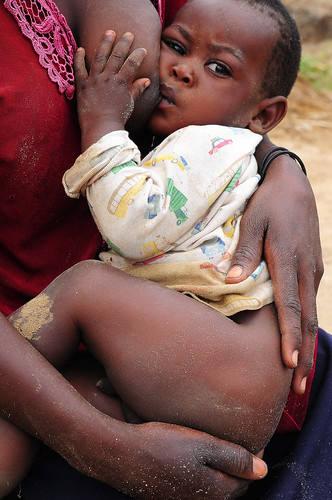I recently read
this post by
Janet Lansbury in which she outlined a debate, between Annie from
PhD in Parenting and herself, that was about breastfeeding as comfort for infants. Janet agrues that breastfeeding an upset infant for comfort is akin to just filling their mouth to shut them up; that it is creating unhealthy assosications between food, comfort, and emotions; and that it can be better to just hold the infant while they cry (
she also believes that children's thumbs are a preferable, and more natural comfort source).
Annie counters that breastfeeding is not always about eating; is the naturally intended source of comfort for infants; and also that research suggests it encourages healthier eating and greater independence later on for children.
I could see the value that both women brought to the debate, although I tended to agree with Annie more often because of my own experiences with my WildChild.
Then I forgot about it.
Until...This semester I started a class called 'Positive Behaviour Support' in which my tutor, Margie, said that she also does some work managing infant behaviours, especially around weaning (
following a question asked by my classmate about her two year old daughter's trantrums - caused by weaning from the dummy).
Margie holds the view that behaviour, no matter who or how old you are, is to get or avoid something, and that the something is either activity, sensory stimulation, or social attention. She also believes that infants and young children are simply trying to get sensory stimulation when they turn to their mother's breast or the dummy for comfort, and that it is simply a matter of replacing the stimulation when weaning. She also believes that relieving a baby's cries is silencing their emotions.
Both Janet Lansbury and Margie (and my Positive Behaviour Support textbook) are right on board with what is called "
Behaviourism", made famous by men such as Skinner, Pavlov and Bandura. They believe that the best way to alter behaviour is to manipulate the preceding events (antecedents) and the consequences. I absolutely see the usefullness of this, and the neccessity of it, in the classroom environment especially.
My problem is this. We are talking about infants, and very young children; and we are talking about breastfeeding and suckling.
I don't believe that breastfeeding (and breastfeeding replacements like dummies and bottles) are
just about food,
just about comfort, or
just a behaviour to be manipulated. I think it's also about human biology.

Katherine Dettwyler, PhD, has written an oft-cited paper called A Natural Age of Weaning (
found here), in which she compares humans, cross-culturally and against other primates, and infers that the natural age of weaning for humans to be somewhere between 2 and 7 years of age.
This PDF by Linda Palmer also examines historical weaning inferences and data from archeological digs, which support this. To me, this indicates that our cultural ideas about weaning (in Australia usually between 1 and 2, in some countries even earlier) are totally at odds with what our biology demands.
Treating breastfeeding, weaning and substitutes just like behaviour to be managed is oversimplifying the reasons children need these things.
Something that has consistently stopped me from weaning WildChild is the belief that if I wean her too early she will be missing part of her natural biology.
There are stem cells in it after all. I also think it's possible that humans are designed to suck for comfort when young, so if the breast is denied they will suck their thumb or a dummy. It's no coincidence that many children need these substitutes up to age 3 and 4, it's in their design. Which is why I don't believe it is no-big-deal to mess with the breastfeeding (or dummy etc) relationship. It is something to be considered very carefully.
I believe WildChild deserves a say in when we end breastfeeding, as i would if she used a dummy or her thumb for comfort. I won't give her total control, but I wont be a dictator either.
What do you think? Is breastfeeding etc, for 'just' comfort, simply like any other behaviour? What's your opinion on weaning from comfort objects, should it be child-led, mother-led, or negotiated?
Disclaimer: I'm sharing my personal thoughts about my own situation, please don't be upset if you have weaned or never breastfed your children, I am not judging in any way. I understand the many many obstacles women face both physically and culturally. If you love your child you are a good parent.


 Katherine Dettwyler, PhD, has written an oft-cited paper called A Natural Age of Weaning (found here), in which she compares humans, cross-culturally and against other primates, and infers that the natural age of weaning for humans to be somewhere between 2 and 7 years of age. This PDF by Linda Palmer also examines historical weaning inferences and data from archeological digs, which support this. To me, this indicates that our cultural ideas about weaning (in Australia usually between 1 and 2, in some countries even earlier) are totally at odds with what our biology demands.
Katherine Dettwyler, PhD, has written an oft-cited paper called A Natural Age of Weaning (found here), in which she compares humans, cross-culturally and against other primates, and infers that the natural age of weaning for humans to be somewhere between 2 and 7 years of age. This PDF by Linda Palmer also examines historical weaning inferences and data from archeological digs, which support this. To me, this indicates that our cultural ideas about weaning (in Australia usually between 1 and 2, in some countries even earlier) are totally at odds with what our biology demands.